News
Migrantes LGBTI en Tijuana ‘buscan una oportunidad para vivir’
Miles de personas en la ciudad mexicana deseen entrar los EEUU
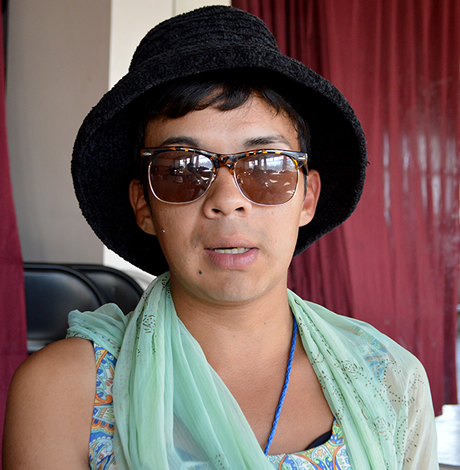
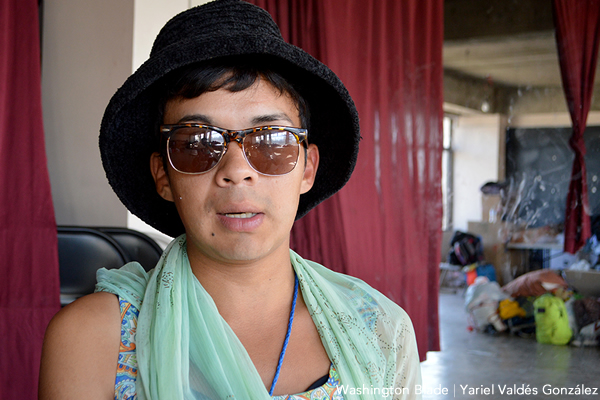
Melani Sofía Rosales Quiñones, una mujer transgénero de la Ciudad de Guatemala, fue golpeada, amenazada y discriminada en su país por el solo hecho de sumir su verdadera identidad de género. (Foto del Washington Blade de Yariel Valdés González)
TIJUANA, México — A Melani Sofía Rosales Quiñones, una mujer transgénero de la Ciudad de Guatemala, la esperaba una banda de homofóbicos a la vuelta de su casa. Era julio de 2017 y al pasar junto a ellos les dijo: Buenas noches y solo eso fue el pretexto para una agresión atroz.
“Me golpearon con bates y palos”, narra ahora Melani. “Me quebraron la mandíbula y el maxilar izquierdo. Estuve tres días sin despertar en el hospital y luego de 15 días me hicieron una cirugía para reconstruirme el rostro. Me pusieron placas y tornillos. Estuve cuatro meses en recuperación”.
Un año antes, las pandillas, que enferman de odio y violencia a medio Latinoamérica, codiciaban su casa como depósito para drogas. Su madre nunca aceptó e interpuso una denuncia por el acoso de las también llamadas “maras”.
“Saliendo de la policía llaman a mi mamá y la amenazan. Le dicen que con ellos no se jugaba y matan a mi hermano menor de 15 años”, ella dice.
Melani cuenta parte de su vida al Washington Blade desde una casa de acogida en el centro de Tijuana, donde momentáneamente amparan a los miembros LGTBI de la caravana migrante, que llegaron a esta ciudad fronteriza unas semanas atrás con el objetivo de solicitar asilo político en los Estados Unidos, una nación en la cual piensan vivir sin temores y con prosperidad económica.
Los migrantes LGTBI, al igual que la caravana, se han dispersado por toda la frontera norte del país. Lo que antes de llegar a México era un grupo compacto, que enfrentaba ofensas y malos tratos de la propia caravana, hoy no son más que pequeñas y débiles fuerzas dispersas en Tijuana, Baja California y Nogales, otro pueblo limítrofe con EEUU, perteneciente al estado de Sonora.
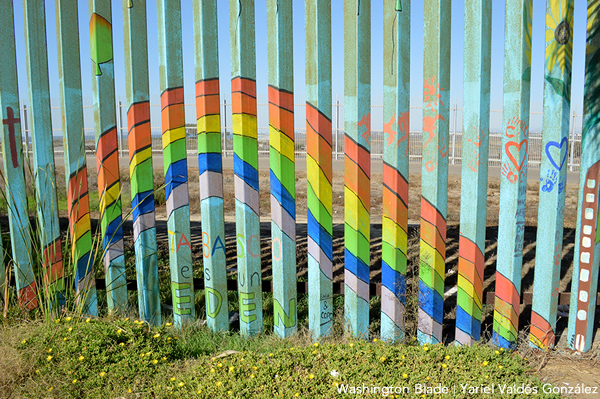
Atravesar este muro y llegar seguros a territorio estadounidense es el deseo de los miles de migrantes varados en Tijuana. Solo buscan una oportunidad de vida en los Estados Unidos. (Foto del Washington Blade de Yariel Valdés González)
Las historias detrás del sueño americano
No es la primera vez que Melani se lanza en dirección norte para tocar suelo estadounidense. En mayo de este año “subió” a Tijuana con otra caravana pero otra agresión le postergó el anhelo. “Me llevé una gran decepción porque oficiales de Tijuana me golpearon cuando me dirigía a la garita de El Chaparral. Luego, fui al hospital y puse una denuncia a los policías en Inmigración”, dice Melani.
Entonces Melani retornó hasta un pueblito entre Guatemala y México, “en territorio ‘nulo’”, dice con la ilusión de que, en algún momento, volvería a caminar hacia su sueño americano. No podía volver a Guatemala, pero tampoco a Tijuana. Por esa época se volvió casi ermitaña. Ella, una chica extrovertida y sociable, vivía alejada de la gente. “Trabajaba en una panadería y de ahí para mi casa. Sin decir alguna palabra, sin saludar”, añade.
Melani huía de una Guatemala donde la violencia se percibe como natural y se manifiesta más aguda contra las comunidades LGBTI. Allí soportan “insultos, sobornos, detenciones arbitrarias y agresiones físicas, que no pocas veces terminan en asesinatos, pero que no se denuncian por temor a las represalias. Las personas LGBTI viven con miedo y no cuentan con redes de apoyo comunitario que les ayuden a enfrentar los escenarios violentos en que habitan”, especifica un diagnóstico sobre la situación de esta comunidad en cuatro países centroamericanos.
Un total de 39 mujeres trans, como Melani, fueron asesinadas de enero a julio de 2017 en Guatemala, según el Observatorio de Personas Trans Asesinadas, ubicando a la nación en el puesto número seis dentro de la lista de países de América Latina y el Caribe con mayores cifras absolutas de personas trans asesinadas.
En Honduras, por otra parte, 40 personas LGTBI han muerto entre 2007 y mayo del presente año, indicó en un comunicado el estatal Comisionado Nacional de los Derechos Humanos en Honduras (Conadeh). Cattrachas, una red lesbiana feminista, indica que 288 personas LGBTI han sido asesinados en Honduras entre 2009 y 2018.
No solo es una situación de inseguridad. Este colectivo en Honduras posee muy bajas posibilidades de empleo. Según reportó Infobae “no existen en el país antecedentes de ninguna persona trans que haya ingresado a un puesto de trabajo en una empresa privada o en una dependencia estatal”.
Amelia Frank-Vitale, antropóloga de la Universidad de Michigan, quien lleva más de un año viviendo en Honduras para estudiar temas de deportación, migración y violencia, confirmó al Blade que “las personas de la comunidad LGBTI están expuestas a todas las formas de violencia que vive cualquier persona en Honduras, que es la mayoría de la población urbana, joven y pobre, pero además están discriminadas, estigmatizadas por su orientación sexual y en muchos casos el Estado está ausente en temas de justicia. Es siempre más crítico para la comunidad LGBTI”.
De esa situación vienen huyendo Alexis Rápalos y Solanyi, dos identidades que habitan un mismo cuerpo robusto de 38 años. En la entrevista con el Blade es Alexis quien habla. Lleva un gorro que cubre una cabeza casi sin pelos y las palabras apenas le salen.
Viene de una familia con bajos recursos y nos ha revelado que, desde los diez años, sufre el flagelo de la discriminación por las calles de su ciudad, San Pedro Sula, la que por cuatro años fue reconocida como la urbe más peligrosa del planeta. De nadie tuvo que despedirse, pues desde que murió su madre hace un año, vive solo.
Sastre y chef de cocina, trabajaba en un restaurante en su país natal, pero decidió sumarse a la caravana en busca de un futuro con más seguridad y una vida sin los sobresaltos de una homofobia generalizada.
Partió sin más que un pantalón y una camisa en su mochila y alcanzó la caravana en la frontera entre Guatemala y México. “Fui descubriendo amigos en la caravana”, refiere Alexis. “Y luego a la comunidad gay. Venimos luchando, peleando muchas cosas porque nos discriminan bastante, nos insultan”.
“El camino ha sido bastante duro”, sostiene Alexis. “A veces nos quedamos dormidos en lugares muy fríos, con tormentas. Yo me enfermé de la gripe con una tos horrible, pero gracias a Dios nos han ayudado con medicinas, con ropa”.
Arribaron a Tijuana pidiendo jalón (auto-stop), a ratos en autobuses y suplicando por la caridad ajena para comer. “Llegamos al albergue que había en la Unidad Deportiva Benito Juárez, pero nosotros estábamos en nuestro grupo aparte. Nos han tratado bien, con ropas, medicinas, comida”, insiste como tratando de agradecer días atenciones recibidas.
Hasta ese albergue, donde las condiciones de insalubridad y hacinamiento eran una constante, los persiguió la homofobia que viaja con algunos de sus coterráneos y los ubica en una posición aún más desfavorable que la del resto. Alexis detalla que eran abucheados en las filas para los alimentos y hubo ocasiones en las que no los dejaron comer. La situación se repetía en las frías duchas a la intemperie, donde la privacidad era un lujo impensable.
Allí, junto a los casi 6.000 centroamericanos que llegaron a aglomerarse en el albergue habilitado por las autoridades de la ciudad, sintió la crudeza del frío de madrugada, durmió en la calle porque no tenía una carpa que lo protegiera y la inusual lluvia de la temporada le humedeció hasta el alma cuando vio empapadas sus pocas pertenencias.
“En el albergue (Benito Juárez) sí pasamos humillaciones, críticas, hasta nos hicieron quitar la bandera gay. Recibimos mucha discriminación, nos dicen que no podemos hacer la misma fila para la comida y para el baño nos dejan de últimos y aquí (Enclave Caracol, nuevo albergue) nos están apoyando demasiado, nos dan nuestro lugar, tenemos baño aparte y todo”, comenta Bairon Paolo González Morera, un gay guatemalteco de 27 años.
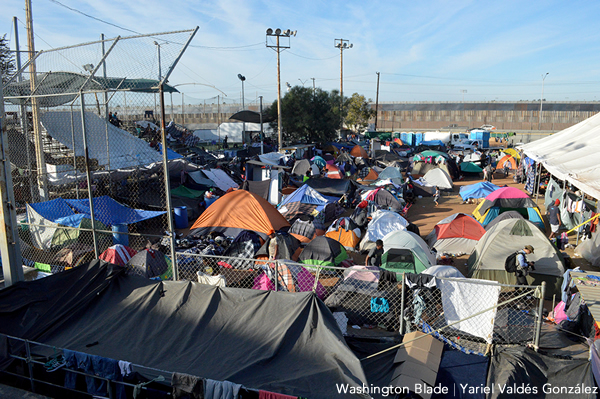
Los integrantes de la caravana LGTBI estuvieron a su llegada a Tijuana en la Unidad Deportiva Benito Juárez, un complejo deportivo convertido en albergue. Allí también fueron discriminados por sus coterráneos. Les hicieron quitar la bandera gay. No los querían en las filas para la alimentación y los dejaban de últimos en las duchas públicas. (Foto del Washington Blade de Yariel Valdés González)
Cuenta Bairon que se travestía por las noches y ejercía la prostitución como Kiara Paola, una actividad que le dejó varias cicatrices en su cuerpo. “Yo me dedicaba a trabajar para llevarle comida a mi hermano gemelo y al más pequeño”, dice. “Ahí mi familia se enteró que era gay. Mi madrastra me discriminó y mi papá no me apoyó y hasta hoy día estoy luchando por mi bienestar, a pesar de que me han dado trabones en la espalda y en diferentes partes de mi cuerpo, pero he salido adelante”.
Vivía solo y constantemente era extorsionado, por lo que decidió unirse a la caravana. Cuando los migrantes arribaron a México, ya trabajaba en un restaurante en Tuxpan y no pensó dos veces unirse a la caravana, que en opinión de la experta en migraciones Frank-Vitale es “un movimiento de desobediencia civil contra un régimen global … La caravana es la forma que se ha reconocido que se puede cruzar México sin estar tan expuesto a los grupos criminales, las autoridades corruptas y sin pagar un coyote para buscar una oportunidad de vivir”.
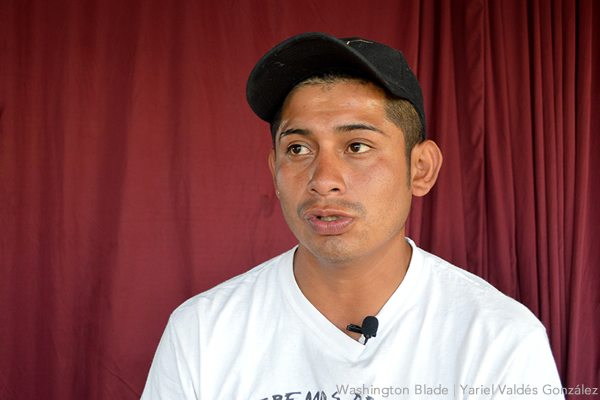
Paolo González Morera, un gay guatemalteco de 27 años, ejercía como trabajador sexual en su país y constantemente era extorsionado y maltratado por su orientación sexual. (Foto del Washington Blade de
Yariel Valdés González)
A la espera del asilo
Una larga fila se ha formado a las afueras del Enclave Caracol, un espacio comunitario ubicado en la calle primera, en el centro de Tijuana, que ha acogido a esta fracción de la caravana LGBTIQ, que llegó semanas después de la primera.
Bajo unas carpas, los propios migrantes se organizan para repartir la comida que ellos mismos han preparado en el interior del edificio, que semanas antes también brindó su espacio para el matrimonio de varias parejas gays.
Nacho, quien prefirió solo presentarse así, es colaborador de Enclave Caracol, y dijo que están apoyando “a la comunidad con la alimentación y agua, el uso de baño, acceso a Internet, uso de teléfonos para que puedan llamar prácticamente a cualquier parte del mundo y en algún momento ha funcionado como albergue”.
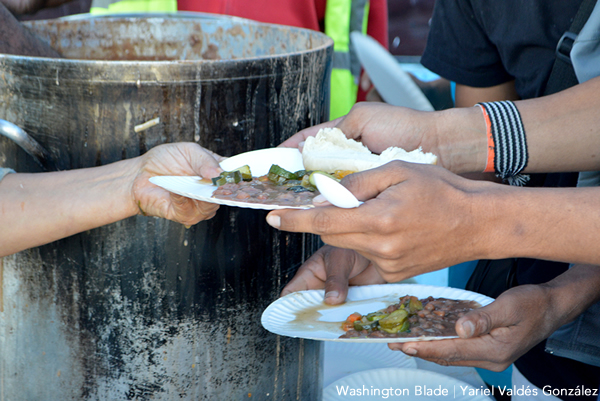
En el Enclave Caracol, son los propios migrantes quienes han cocinado y organizado la vida allí. Con las donaciones de la sociedad civil de varias ciudades ha sido posible mantener a las decenas de ellos que
allí se resguardan. (Foto del Washington Blade de Yariel Valdés González)
En los primeros días de auxilio a estos desplazados eran los trabajadores del lugar quienes cocinaban gran parte de los alimentos y garantizaban la limpieza. Pero, dice “poco a poco se han ido involucrando personas de la caravana. Actualmente ninguna persona del Enclave ha estado en la cocina. Estas últimas semanas hemos recibido donaciones y también hemos ido a los mercados por la merma y la limpiamos, la procesamos y se cocina. Ellos mismos están organizando la limpia y entrega de la comida”.
Nacho declaró que varias personas de la sociedad civil de Los Ángeles, San Diego y de la propia ciudad de Tijuana aportan dinero, comida, voluntariado, productos de limpieza, platos y vasos desechables para aliviar la tensa situación que se vive ahora mismo por la llegada de miles de migrantes a esta urbe fronteriza, muchos de los cuales no han iniciado su proceso de asilo político.
Y es que, al decir de la académica Frank-Vitale, este proceso se ha puesto intencionalmente difícil en EEUU. “Hay una lista muy larga de personas que solicitan el asilo, que se han entregado en la garita y buscan seguir el proceso correcto, bajo la ley internacional”, dice. “Se ha dicho que van a tener que esperar hasta dos meses para tener la oportunidad de hablar de su caso, y eso para personas vulnerables, que huyen de una persecución, que viven bajo la lluvia, el frío, a la intemperie todo ese tiempo, la verdad es una crisis humanitaria fatal”.
“A veces uno se desespera porque no hay un lugar estable. Nos vamos de aquí para allá. Dicen que hoy nos van a llevar para otra casa para esperar a los abogados que nos van a ayudar con los papeles”, dice esperanzado Alexis.
Sin embargo, Melani es más realista al comentar sobre su petición de asilo: “La situación de nosotros está un poco difícil porque siguen llegando muchas personas. Donald Trump cerró la frontera y el trámite está muy complicado. Por eso las personas van a la frontera a meter presión”.
Frank-Vitale considera que el actual sistema de asilo debe cambiar para reconocer las formas modernas de violencia y persecución a las que se ven expuestas las personas y en especial los grupos LGTBI. “Tomando todo eso en cuenta, sí es posible. Hay casos de Centroamérica que entran perfectamente en el sistema, siempre y cuando tengan realmente el temor por sus vidas en sus países y mucha gente tiene un miedo muy verdadero”.
Ese temor, que ha colmado gran parte de la vida de Melani, la acompañará, incluso, en territorio norteamericano, pues en “la caravana anterior había una chica que se llamaba Roxsana, quien murió porque tenía VIH, pero la autopsia reveló que había sido agredida por los oficiales del Servicio de Inmigración y Control de Aduanas (ICE) de Estados Unidos”.
La primera autopsia realizada en Hernández, una mujer trans hondureña con VIH que murió bajo custodia de ICE en Nuevo México el 25 de mayo, menciona la causa de muerte como un paro cardíaco. La segunda autopsia a la que se refirió Melani muestra que Hernández fue golpeada, pero no identifica las personas que la atacaron mientras estaba bajo custodia.
La autopsia original realizada en Hernández, una mujer trans hondureña con VIH que murió bajo custodia de ICE en Nuevo México el 25 de mayo, menciona la causa de la muerte como un paro cardíaco. La segunda autopsia a la que se refirió Melani muestra que Hernández fue golpeado, pero no identifica quién la atacó mientras estaba bajo custodia.
El tema ha llegado hasta el Senado estadounidense, pues tres senadores invitaron recientemente al Servicio de Aduanas e Inmigración y Aduanas y Protección de Fronteras de EEUU a entregar documentos relacionados con el caso de Roxsana, una mujer trans hondureña con VIH que murió bajo su custodia el año pasado.
Pese a todas estas situaciones, pese a un presidente xenófobo que comanda al otro lado, pese a un poderoso ejército atrincherado en la frontera, pese a las largas filas para ser escuchados, pese a la incertidumbre constante, Bairon se mantiene firme en su decisión: “Ya estamos acá. Con tanto trabajo que nos costó, yo no regreso”.
Ya sabemos por qué.
Ecuador
Justicia reconoce delito de odio en caso de bullying en Instituto Nacional Mejía de Ecuador
Johana B se suicidó el 11 de abril de 2023

A casi tres años del suicidio de Johana B., quien estudió en el Instituto Nacional Mejía, colegio emblemático de Quito, el Tribunal de la Corte Nacional de Justicia ratificó la condena para el alumno responsable del acoso escolar que la llevó a quitarse la vida.
Según información de la Fiscalía, el fallo de última instancia deja en firme la condena de cuatro años de internamiento en un centro para adolescentes infractores, en una audiencia de casación pedida por la defensa del agresor, tres meses antes de que prescriba el caso.
Con la sentencia, este caso es uno de los primeros en el país en reconocer actos de odio por violencia de género, delito tipificado en el artículo 177 del Código Orgánico Penal Integral (COIP).
El suicidio de Johana B. ocurrió el 11 abril de 2023 y fue consecuencia del acoso escolar por estereotipos de género que enfrentó la estudiante por parte de su agresor, quien constantemente la insultaba y agredía por su forma de vestir, llevar el cabello corto o practicar actividades que hace años se consideraban exclusivamente para hombres, como ser mando de la Banda de Paz en el Instituto Nacional Mejía.
Desde la muerte de Johana, su familia buscaba justicia. Su padre, José, en una entrevista concedida a edición cientonce para la investigación periodística Los suicidios que quedan en el clóset a causa de la omisión estatal afirmó que su hija era acosada por su compañero y otres estudiantes con apodos como “marimacha”, lo que también fue corroborado en los testimonios recogidos por la Unidad de Justicia Juvenil No. 4 de la Fiscalía.
Los resultados de la autopsia psicológica y del examen antropológico realizados tras la muerte de Johana confirmaron las versiones de sus compañeras y docentes: que su agresor la acosó de manera sistemática durante dos años. Los empujones, jalones de cabello o burlas, incluso por su situación económica, eran constantes en el aula de clase.
La violencia que recibió Johana escaló cuando su compañero le dio un codazo en la espalda ocasionándole una lesión que le imposibilitó caminar y asistir a clases.
Días después del hecho, la adolescente se quitó la vida en su casa, tras escuchar que la madre del agresor se negó a pagar la mitad del valor de una tomografía para determinar la lesión en su espalda, tal como lo había acordado previamente con sus padres y frente al personal del DECE (Departamento de Consejería Estudiantil del colegio), según versiones de su familia y la Fiscalía.
#AFONDO | Johana se suicidó el 11 de abril de 2023, tras ser víctima de acoso escolar por no cumplir con estereotipos femeninos 😢.
Dos semanas antes, uno de sus compañeros le dio un codazo en la espalda, ocasionándole una lesión que le imposibilitó caminar 🧵 pic.twitter.com/bXKUs9YYOm
— EdicionCientonce (@EdCientonce) September 3, 2025
“Era una chica linda, fuerte, alegre. Siempre nos llevamos muy bien, hemos compartido todo. Nos dejó muchos recuerdos y todos nos sentimos tristes; siempre estamos pensando en ella. Es un vacío tan grande aquí, en este lugar”, expresó José a Edición Cientonce el año pasado.
Para la fiscal del caso y de la Unidad de Justicia Juvenil de la Fiscalía, Martha Reino, el suicidio de la adolescente fue un agravante que se contempló durante la audiencia de juzgamiento de marzo de 2024, según explicó a este medio el año pasado. Desde entonces, la familia del agresor presentó un recurso de casación en la Corte Nacional de Justicia, que provocó la dilatación del proceso.
En el fallo de última instancia, el Tribunal también dispuso que el agresor pague $3.000 a la familia de Johana B. como reparación integral. Además, el adolescente deberá recibir medidas socioeducativas, de acuerdo al artículo 385 del Código Orgánico de la Niñez y Adolescencia, señala la Fiscalía.
El caso de Johana también destapó las omisiones y negligencias del personal del DECE y docentes del Instituto Nacional Mejía. En la etapa de instrucción fiscal se comprobó que no se aplicaron los protocolos respectivos para proteger a la víctima.
De hecho, la Fiscalía conoció el caso a raíz de la denuncia que presentó su padre, José, y no por el DECE, aseguró la fiscal el año pasado a Edición Cientonce.
Pese a estas omisiones presentadas en el proceso, el fallo de última instancia sólo ratificó la condena para el estudiante.
U.S. Military/Pentagon
4th Circuit rules against discharged service members with HIV
Judges overturned lower court ruling

A federal appeals court on Wednesday reversed a lower court ruling that struck down the Pentagon’s ban on people with HIV enlisting in the military.
The conservative three-judge panel on the 4th U.S. Circuit Court of Appeals overturned a 2024 ruling that had declared the Defense Department and Army policies barring all people living with HIV from military service unconstitutional.
The 4th Circuit, which covers Maryland, North Carolina, South Carolina, Virginia, and West Virginia, held that the military has a “rational basis” for maintaining medical standards that categorically exclude people living with HIV from enlisting, even those with undetectable viral loads — meaning their viral levels are so low that they cannot transmit the virus and can perform all duties without health limitations.
This decision could have implications for other federal circuits dealing with HIV discrimination cases, as well as for nationwide military policy.
The case, Wilkins v. Hegseth, was filed in November 2022 by Lambda Legal and other HIV advocacy groups on behalf of three individual plaintiffs who could not enlist or re-enlist based on their HIV status, as well as the organizational plaintiff Minority Veterans of America.
The plaintiffs include a transgender woman who was honorably discharged from the Army for being HIV-positive, a gay man who was in the Georgia National Guard but cannot join the Army, and a cisgender woman who cannot enlist in the Army because she has HIV, along with the advocacy organization Minority Veterans of America.
Isaiah Wilkins, the gay man, was separated from the Army Reserves and disenrolled from the U.S. Military Academy Preparatory School after testing positive for HIV. His legal counsel argued that the military’s policy violates his equal protection rights under the Fifth Amendment’s Due Process Clause.
In August 2024, a U.S. District Court sided with Wilkins, forcing the military to remove the policy barring all people living with HIV from joining the U.S. Armed Services. The court cited that this policy — and ones like it that discriminate based on HIV status — are “irrational, arbitrary, and capricious” and “contribute to the ongoing stigma surrounding HIV-positive individuals while actively hampering the military’s own recruitment goals.”
The Pentagon appealed the decision, seeking to reinstate the ban, and succeeded with Wednesday’s court ruling.
Judge Paul V. Niemeyer, one of the three-judge panel nominated to the 4th Circuit by President George H. W. Bush, wrote in his judicial opinion that the military is “a specialized society separate from civilian society,” and that the military’s “professional judgments in this case [are] reasonably related to its military mission,” and thus “we conclude that the plaintiffs’ claims fail as a matter of law.”
“We are deeply disappointed that the 4th Circuit has chosen to uphold discrimination over medical reality,” said Gregory Nevins, senior counsel and employment fairness project director for Lambda Legal. “Modern science has unequivocally shown that HIV is a chronic, treatable condition. People with undetectable viral loads can deploy anywhere, perform all duties without limitation, and pose no transmission risk to others. This ruling ignores decades of medical advancement and the proven ability of people living with HIV to serve with distinction.”
“As both the 4th Circuit and the district court previously held, deference to the military does not extend to irrational decision-making,” said Scott Schoettes, who argued the case on appeal. “Today, servicemembers living with HIV are performing all kinds of roles in the military and are fully deployable into combat. Denying others the opportunity to join their ranks is just as irrational as the military’s former policy.”
New York
Lawsuit to restore Stonewall Pride flag filed
Lambda Legal, Washington Litigation Group brought case in federal court

Lambda Legal and Washington Litigation Group filed a lawsuit on Tuesday, challenging the Trump-Vance administration’s removal of the Pride flag from the Stonewall National Monument in New York earlier this month.
The suit, filed in the U.S. District Court for the Southern District of New York, asks the court to rule the removal of the Pride flag at the Stonewall National Monument is unconstitutional under the Administrative Procedures Act — and demands it be restored.
The National Park Service issued a memorandum on Jan. 21 restricting the flags that are allowed to fly at National Parks. The directive was signed by Trump-appointed National Park Service Acting Director Jessica Bowron.
“Current Department of the Interior policy provides that the National Park Service may only fly the U.S. flag, Department of the Interior flags, and the Prisoner of War/Missing in Action flag on flagpoles and public display points,” the letter from the National Park Service reads. “The policy allows limited exceptions, permitting non-agency flags when they serve an official purpose.”
That “official purpose” is the grounds on which Lambda Legal and the Washington Litigation Group are hoping a judge will agree with them — that the Pride flag at the Stonewall National Monument, the birthplace of LGBTQ rights movement in the U.S., is justified to fly there.
The plaintiffs include the Gilbert Baker Foundation, Charles Beal, Village Preservation, and Equality New York.
The defendants include Interior Secretary Doug Burgum; Bowron; and Amy Sebring, the Superintendent of Manhattan Sites for the National Park Service.
“The government’s decision is deeply disturbing and is just the latest example of the Trump administration targeting the LGBTQ+ community. The Park Service’s policies permit flying flags that provide historical context at monuments,” said Alexander Kristofcak, a lawyer with the Washington Litigation Group, which is lead counsel for plaintiffs. “That is precisely what the Pride flag does. It provides important context for a monument that honors a watershed moment in LGBTQ+ history. At best, the government misread its regulations. At worst, the government singled out the LGBTQ+ community. Either way, its actions are unlawful.”
“Stonewall is the birthplace of the modern LGBTQ+ rights movement,” said Beal, the president of the Gilbert Baker Foundation. The foundation’s mission is to protect and extend the legacy of Gilbert Baker, the creator of the Pride flag.
“The Pride flag is recognized globally as a symbol of hope and liberation for the LGBTQ+ community, whose efforts and resistance define this monument. Removing it would, in fact, erase its history and the voices Stonewall honors,” Beal added.
The APA was first enacted in 1946 following President Franklin D. Roosevelt’s creation of multiple new government agencies under the New Deal. As these agencies began to find their footing, Congress grew increasingly worried that the expanding powers these autonomous federal agencies possessed might grow too large without regulation.
The 79th Congress passed legislation to minimize the scope of these new agencies — and to give them guardrails for their work. In the APA, there are four outlined goals: 1) to require agencies to keep the public informed of their organization, procedures, and rules; 2) to provide for public participation in the rule-making process, for instance through public commenting; 3) to establish uniform standards for the conduct of formal rule-making and adjudication; and 4) to define the scope of judicial review.
In layman’s terms, the APA was designed “to avoid dictatorship and central planning,” as George Shepherd wrote in the Northwestern Law Review in 1996, explaining its function.
Lambda Legal and the Washington Litigation Group are arguing that not only is the flag justified to fly at the Stonewall National Monument, making the directive obsolete, but also that the National Park Service violated the APA by bypassing the second element outlined in the law.
“The Pride flag at the Stonewall National Monument honors the history of the fight for LGBTQ+ liberation. It is an integral part of the story this site was created to tell,” said Lambda Legal Chief Legal Advocacy Officer Douglas F. Curtis in a statement. “Its removal continues the Trump administration’s disregard for what the law actually requires in their endless campaign to target our community for erasure and we will not let it stand.”
The Washington Blade reached out to the NPS for comment, and received no response.
-

 Theater5 days ago
Theater5 days agoMagic is happening for Round House’s out stage manager
-

 Baltimore3 days ago
Baltimore3 days ago‘Heated Rivalry’ fandom exposes LGBTQ divide in Baltimore
-

 Real Estate3 days ago
Real Estate3 days agoHome is where the heart is
-

 District of Columbia3 days ago
District of Columbia3 days agoDeon Jones speaks about D.C. Department of Corrections bias lawsuit settlement




















